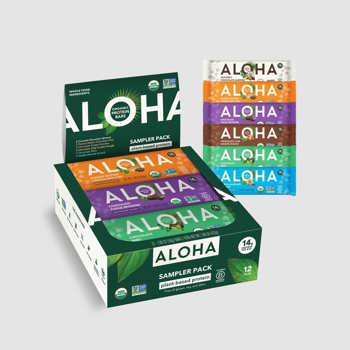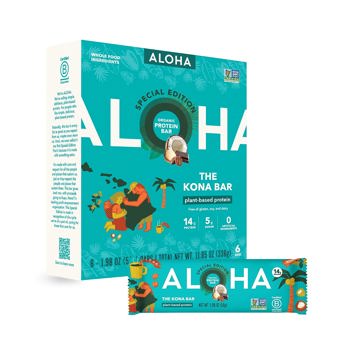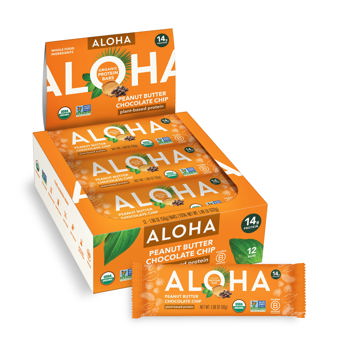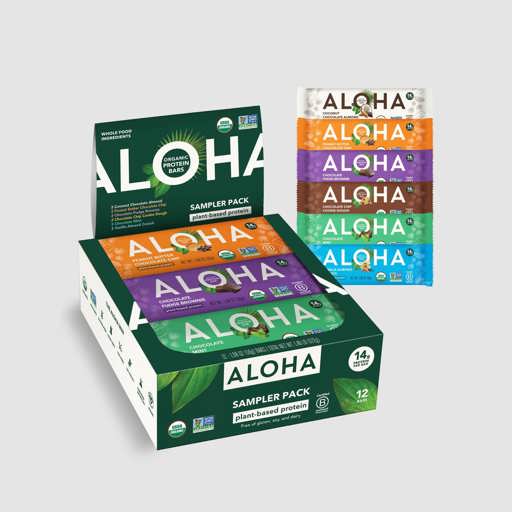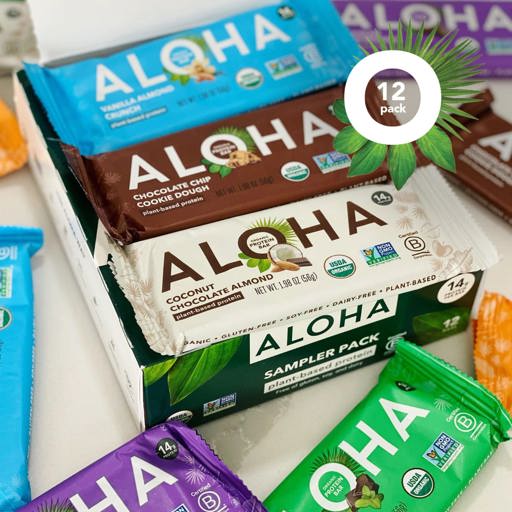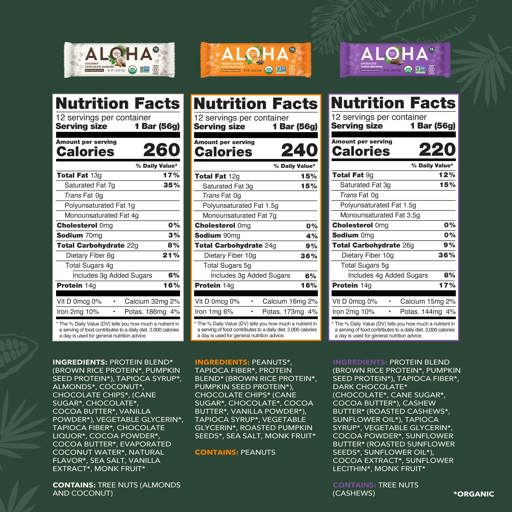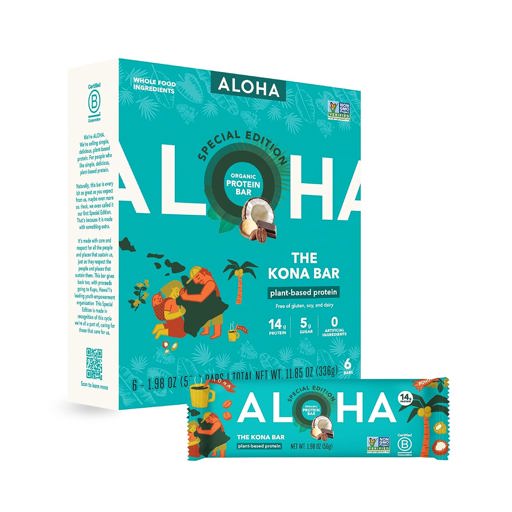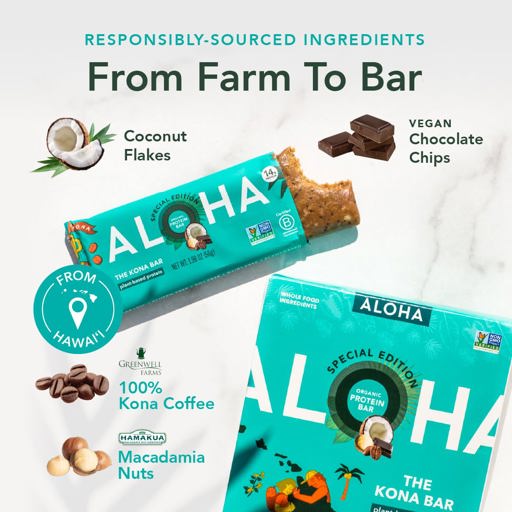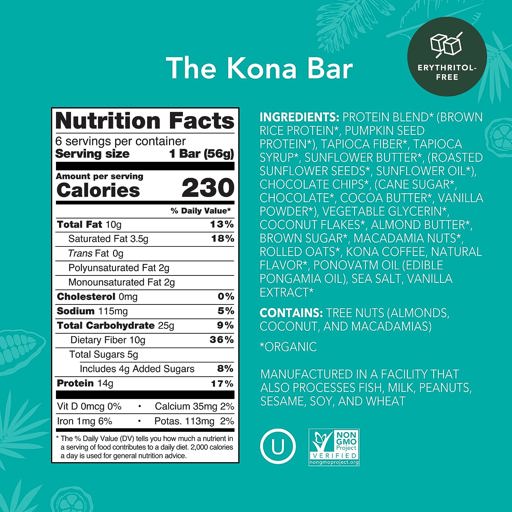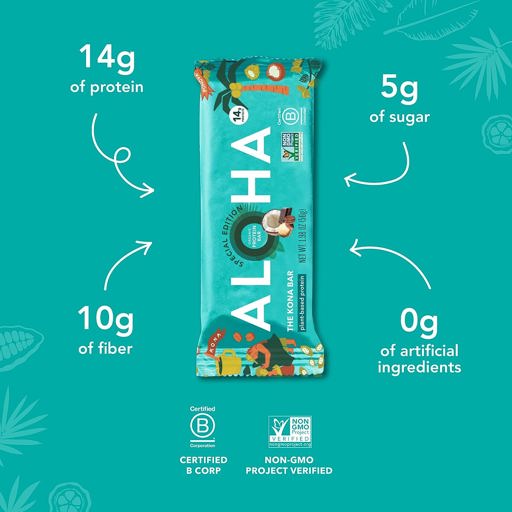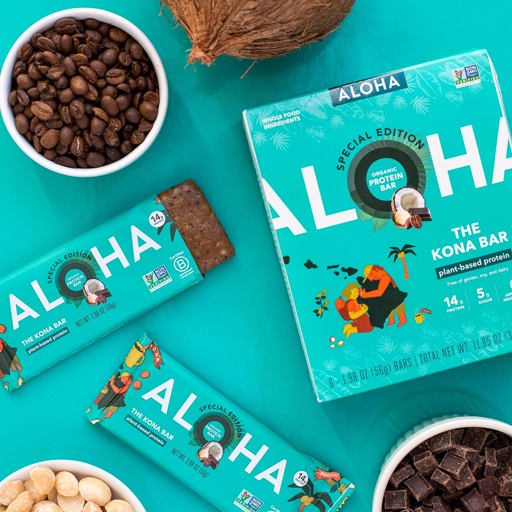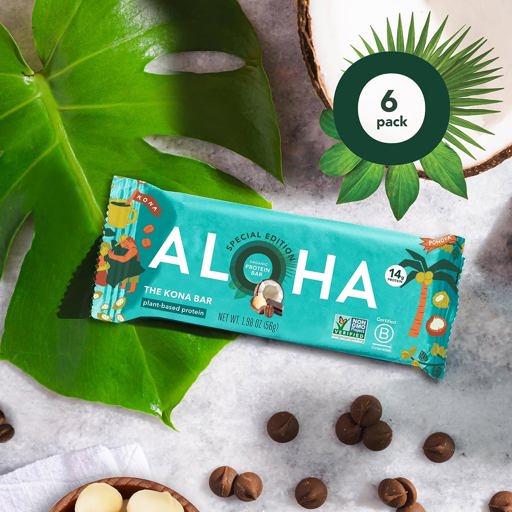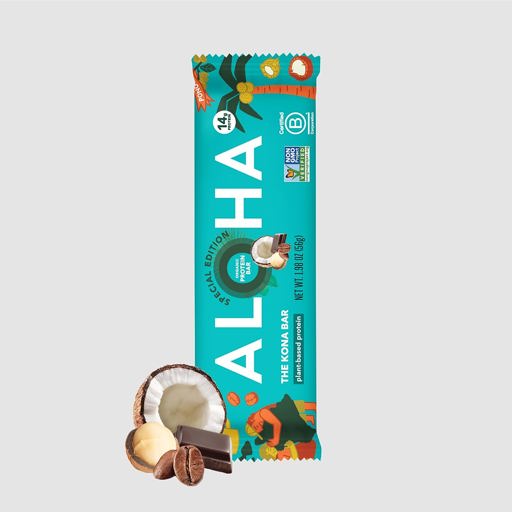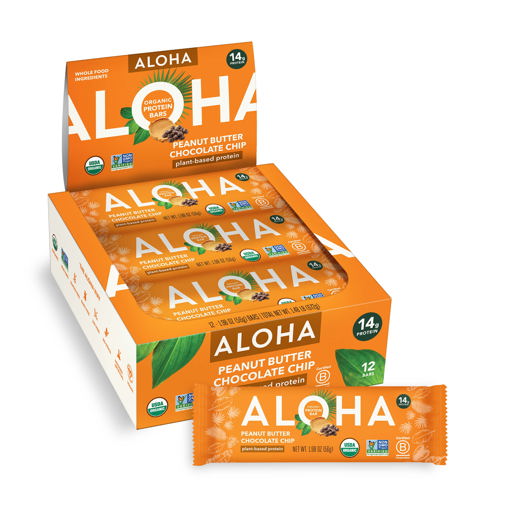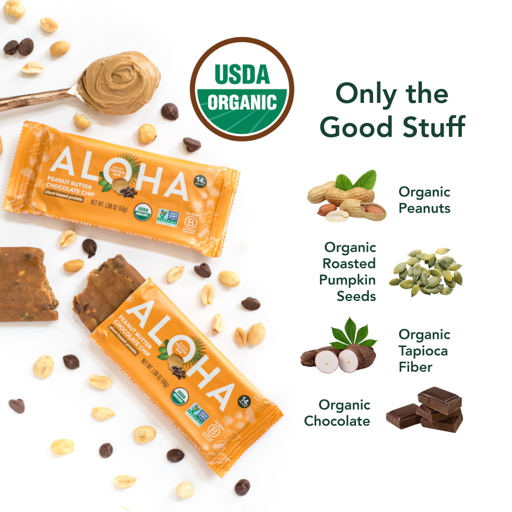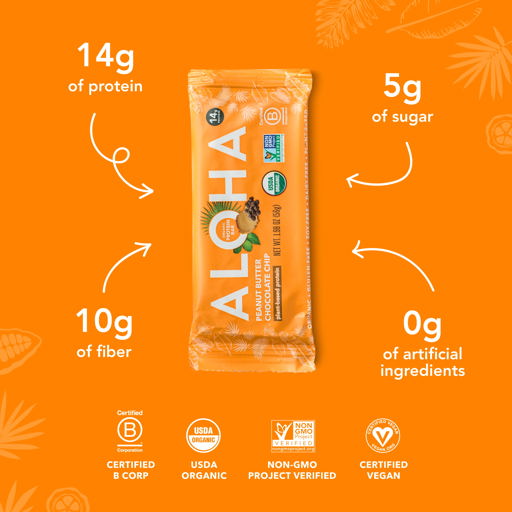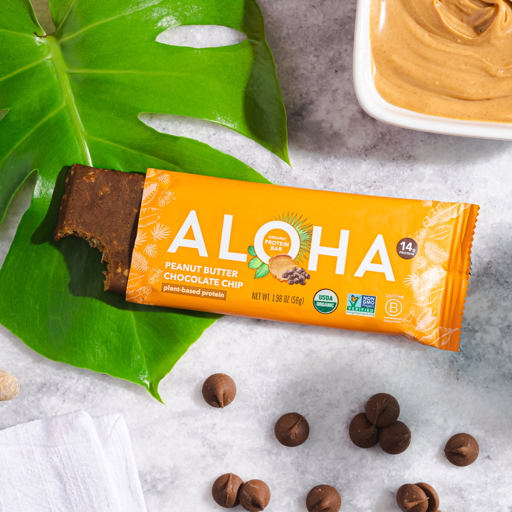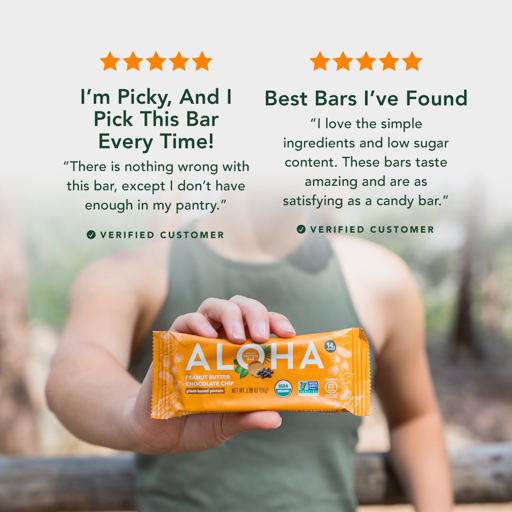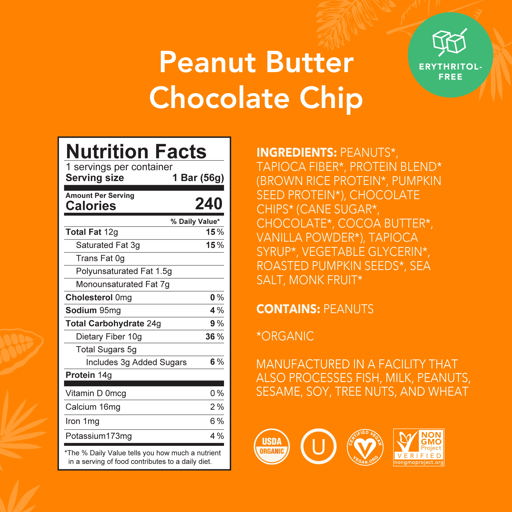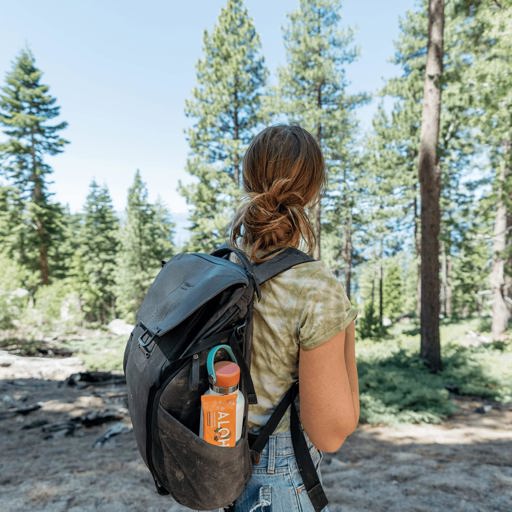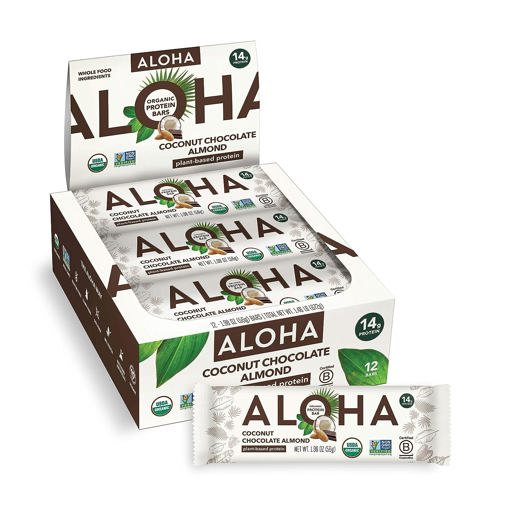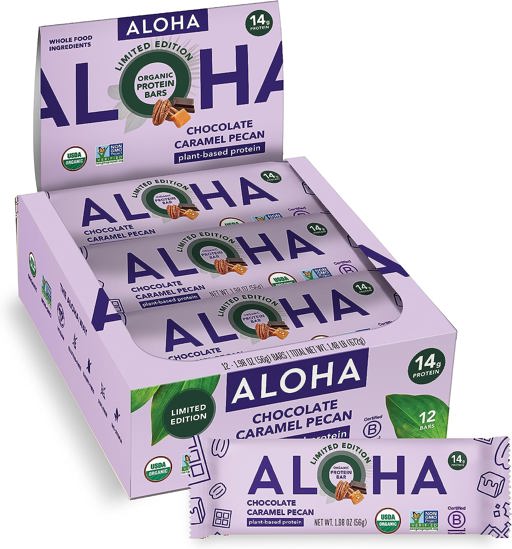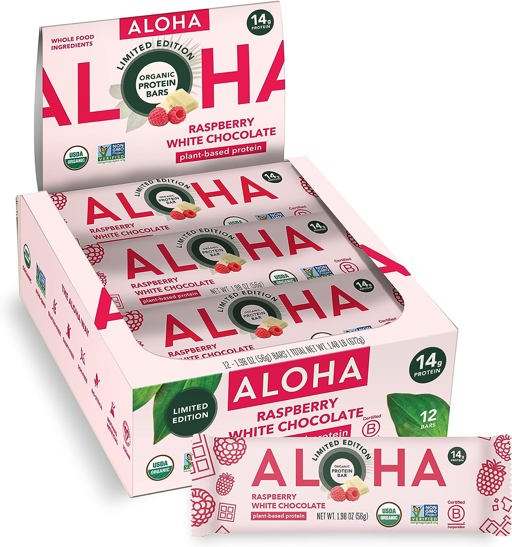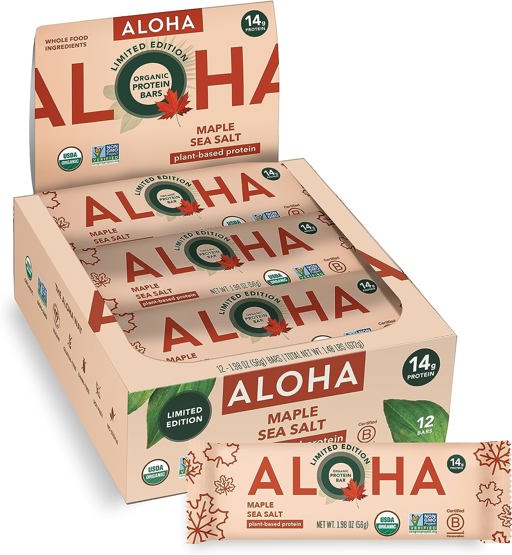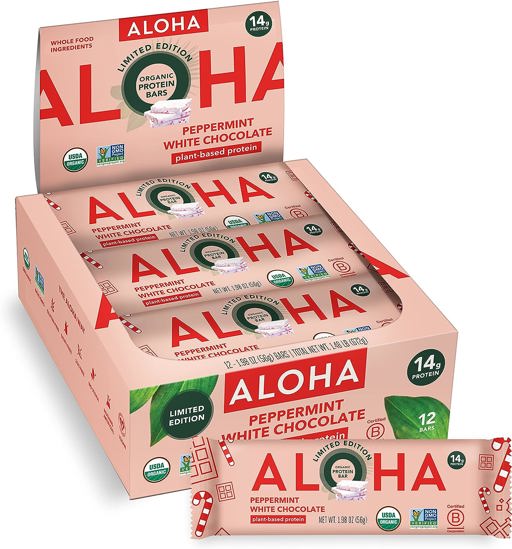Bestsellers for Protein Bars
When you're powering through those barbell workouts, fueling your body with the right nutrients is key to smashing your fitness goals and ensuring a speedy recovery. Protein plays a starring role in this process, helping repair and build muscle tissue that gets broken down during exercise. But figuring out how much protein you need, when to eat it for optimal benefits, and how to incorporate enough of it into your diet can feel like lifting weights itself! Don't worry; whether before or after hitting the gym, there are simple ways (like grabbing an ALOHA protein bar) to make sure you’re getting enough of this crucial nutrient without overcomplicating things. Let's dive into making eating healthy straightforward so you can focus on what really matters - feeling strong and vibrant on your unique journey towards health.
Protein and Barbell Workouts: Why We Need It

Protein is essential for anyone engaging in barbell or weightlifting workouts. It's the building block of muscle, helping to repair and grow the tissues damaged during your lifting sessions. Without enough protein, your body can't recover as efficiently, which might slow down your progress and increase the risk of injury.
After a workout, your muscles are like sponges – they're primed to absorb nutrients, especially protein. Consuming protein post-exercise provides the amino acids necessary for muscle repair and growth. This process is crucial for improving strength and increasing muscle size over time. Studies have shown that not getting enough protein can lead to muscle loss, especially if you're in a calorie deficit.
Moreover, protein helps keep you full longer, which can be beneficial if you're trying to manage your weight or reduce body fat. A diet rich in high-quality protein supports fat loss while preserving lean muscle mass. This balance is key for achieving a toned and strong physique.
It's also worth noting that different types of exercise may require varying amounts of protein. Resistance training, like lifting barbells, significantly increases your protein needs compared to less intensive activities. Ensuring you meet these needs can help maximize the benefits of your workouts.
Incorporating a variety of protein sources throughout the day is a good strategy to meet your requirements. Plant-based options like those offered by ALOHA can provide high-quality protein while also fitting into various dietary preferences.
Explore ALOHA's selection of high-protein bars and shakes.
Remember, consistency is key. Regularly consuming adequate amounts of protein along with engaging in resistance training will help you see improvements in strength and muscle definition over time.
How Much Protein Should I Eat?

Determining the right amount of protein you need can be a bit like solving a puzzle. It's not one-size-fits-all, but there are guidelines to help you figure it out. Generally, if you're lifting weights regularly, aiming for about 1.6 to 2.2 grams of protein per kilogram of body weight each day is a good target. This range helps support muscle repair and growth, ensuring your workouts are as effective as possible.
For someone weighing 68 kilograms (about 150 pounds), this means consuming between 109 to 150 grams of protein daily. It might sound like a lot, but spreading this intake throughout the day can make it more manageable. Including a source of protein in every meal and snack helps keep your muscles fed and ready to recover from your last workout session.
Research suggests that consuming 20-25 grams of high-quality protein soon after your workout maximizes muscle protein synthesis (MPS), the process your body uses to repair and build muscle fibers. This is where grabbing a convenient option like an ALOHA protein bar can be super handy, especially when you're on the go.
It's also important to remember that more isn't always better. Consuming significantly more than 2.2 grams per kilogram doesn't seem to offer additional benefits for muscle growth and could put unnecessary strain on your kidneys over time.
Lastly, variety is key. Mixing up your protein sources not only keeps meals interesting but also ensures you're getting a broad spectrum of essential amino acids. From plant-based options like lentils and quinoa to animal sources such as chicken and fish, diversifying your protein intake supports overall health alongside your fitness goals.
Before or After Workouts: When to Eat Protein

When it comes to fueling your barbell workouts with protein, timing can be everything. You might wonder whether it's better to eat protein before or after you hit the gym. The truth is, both timings have their benefits, and understanding them can help you make the most out of your workout routine.
Eating protein before your workout ensures that amino acids are available for muscle synthesis during your exercise. It acts like prepping your muscles for the work ahead, giving them the building blocks they need to perform and endure. On the other hand, consuming protein after your workout helps in recovery by repairing the muscle tissues that were broken down during exercise. This post-workout protein intake is crucial for muscle growth and strength gains.
Research has shown that the window for optimal protein absorption isn't as narrow as previously thought. Whether you consume protein immediately after your workout or a few hours later doesn't significantly impact muscle growth and repair. What's more important is ensuring you're getting enough protein throughout the day.
If you had a meal rich in protein 1-2 hours before working out, you might not need to rush for a protein shake right after. Your body will still be processing the nutrients from your pre-workout meal. However, if it's been several hours since you last ate, grabbing something high in protein soon after finishing at the gym can be beneficial.
Read our deep dive, "Should I Eat a Protein Bar Before or After a Workout?"
For those always on-the-go, having a convenient source of high-quality protein like an ALOHA plant-based protein bar can make sticking to these guidelines easier. Whether before or after your workout, these bars can provide a quick and delicious way to meet your protein needs without fuss.
Remember, consistency with your overall daily protein intake plays a bigger role in muscle repair and growth than timing alone. Aim to include a variety of protein sources in your diet throughout the day to support your fitness goals and recovery needs effectively.
Protein Bars: How to Eat Enough Protein

Protein bars can be a game-changer for meeting your protein needs, especially when you're juggling a busy schedule with regular barbell workouts. They offer a convenient and efficient way to ensure you're fueling your muscles with the essential nutrients they need to recover and grow stronger. By incorporating protein bars into your diet, you can easily keep up with your protein intake without having to prepare complex meals every time.
Choosing the right protein bar is crucial. Look for bars that contain between 20-25 grams of high-quality protein to maximize muscle protein synthesis, the process that helps repair and build muscle fibers after a workout. This amount has been shown to be effective in supporting muscle recovery and growth in resistance-trained individuals. ALOHA's plant-based protein bars fit this criterion perfectly, offering a delicious and convenient option for both pre- and post-workout nutrition.
In addition to the amount of protein, it's important to consider the quality of ingredients in the protein bars you choose. Opt for bars made with whole food ingredients and without added sugars or artificial additives. This ensures you're not only getting the protein your body needs but also nourishing it with wholesome ingredients that support overall health.
Protein bars are not just for post-workout recovery. Eating one before your workout can provide your muscles with the amino acids they need to perform optimally during your session. It's like giving your muscles a head start by supplying them with the building blocks they require for endurance and strength.
For those times when you're on-the-go or in a rush, having a protein bar handy can make all the difference in sticking to your nutrition goals. Whether it's a quick breakfast on your way to the gym or a mid-afternoon snack to keep hunger at bay, protein bars offer a practical solution to help you stay on track.
Remember, while protein bars are an excellent supplement to your diet, they should complement a balanced intake of proteins from various sources throughout the day. Including a mix of plant-based proteins like lentils, chickpeas, and quinoa alongside animal proteins ensures you're getting a wide range of essential amino acids and nutrients.
In summary, integrating high-quality protein bars into your diet is an effective strategy for ensuring you meet your daily protein requirements. They provide convenience, variety, and nutritional benefits that support muscle recovery and growth as part of an active lifestyle centered around barbell workouts.
FAQ

Is it necessary to consume protein immediately after a workout?
No, the anabolic window is more flexible than once thought. While it's beneficial to consume protein within a few hours post-workout, immediate consumption isn't crucial for muscle recovery and growth.
How can vegetarians and vegans meet their protein needs?
Vegetarians and vegans can meet their protein needs through plant-based sources like lentils, chickpeas, quinoa, tofu, and tempeh. Diversifying protein sources ensures a sufficient intake of essential amino acids.
Does the type of protein matter for muscle gain?
Yes, the quality and type of protein matter. Protein with a high biological value, containing all essential amino acids, is most effective for muscle repair and growth. Both animal and plant-based proteins can fit this profile when combined properly.
Can protein help with weight loss?
Protein can be beneficial for weight loss as it increases satiety, reducing overall calorie intake. It also helps preserve lean muscle mass during a calorie deficit, supporting metabolic rate.
Can eating too much protein be harmful?
Yes, consuming significantly more protein than your body needs can lead to negative health effects over time. It can cause digestive issues, dehydration, and kidney strain. Balance your protein intake with other nutrients for optimal health.
Should I adjust my protein intake on rest days?
No significant adjustments are needed on rest days, as your body still requires protein for recovery and muscle maintenance. Maintaining your regular protein intake supports continuous muscle repair and growth.
Do older adults have different protein requirements?
Yes, older adults may require more protein to offset age-related muscle loss (sarcopenia). Increased protein can support muscle maintenance and overall mobility in older adults.
How does protein affect athletic performance?
Protein supports muscle repair, growth, and overall recovery, positively affecting athletic performance. Adequate protein intake can lead to improvements in strength, power, and endurance over time.
Can protein intake influence mood or cognitive function?
Yes, protein contains amino acids like tryptophan, which are precursors to neurotransmitters involved in mood regulation and cognitive function. A balanced protein intake can support brain health and mood.
Is protein powder as effective as whole foods for protein intake?
Protein powders can be an effective and convenient supplement to meet protein needs, especially post-workout. However, whole foods also offer additional nutrients like vitamins, minerals, and fiber that are beneficial for overall health.
How can I track my protein intake?
Use food tracking apps or a journal to record your daily protein intake. Most apps provide nutritional breakdowns of foods, helping ensure you meet your protein and other nutrient goals.
Are there any times when my protein needs might increase?
Yes, during periods of intense training, recovery from injury, or when starting a new workout program, your body might require more protein to support increased muscle repair and growth.
Can drinking water affect protein absorption?
Staying hydrated is essential for overall health, but it doesn't directly affect protein absorption. Adequate water intake can support the digestion process and nutrient transportation, including protein.
Is it possible to get enough protein without eating meat?
Yes, it is entirely possible to meet protein needs without consuming meat by eating a variety of plant-based protein sources and dairy or eggs for vegetarians.
Does consuming protein before bed boost muscle growth?
Eating protein before bed can support overnight muscle repair and growth due to the sustained release of amino acids during sleep. This practice can contribute to muscle recovery and gains when combined with regular resistance training.
ALOHA does not provide medical advice, diagnosis, or treatment. Any information published on this website or by this company is not intended as medical advice. Always consult a qualified health or mental health professional with any questions or concerns about your physical or mental health.
ALOHA Buying Guide

Protein bars are a popular choice if you are looking to incorporate more protein into your diet or just seeking a convenient and nutritious snack option. These bars come in a variety of flavors and formulations, making it important to consider certain factors before making a purchase.
First and foremost, protein content is a key factor to consider when choosing a protein bar. Look for bars that contain at least 10-20 grams of protein per serving to ensure you are getting an adequate amount. At ALOHA, all of our plant-based protein bars come with 14g of protein. Additionally, check the source of the protein. Some bars use whey protein, while others opt for plant-based options such as pea or soy protein. Choose the one that aligns with your dietary preferences and needs.
Another important consideration is the ingredient list. Choose protein bars that are made with natural, whole food ingredients and avoid those that contain artificial additives or excessive amounts of sugar. Look for bars that are gluten-free, vegan, and non-GMO if you have specific dietary restrictions or preferences.
Texture and taste are also important factors to consider. Some protein bars have a chewy texture, while others are more crunchy. Similarly, flavors can range from classic chocolate chip to unique combinations like raspberry white chocolate. Experiment with different brands and flavors to find the ones that you enjoy the most.
Best Seller
Protein Bar Sample Pack (Pack of 12)
The Protein Bar Sample Pack offers a variety of flavors, providing customers with options to suit their taste preferences. These bars are high in fiber, which can aid in digestion and promote satiety. Additionally, they are made from 100% USDA organic ingredients, ensuring that they are free from pesticides and harmful chemicals. The fact that these bars are vegan and gluten-free makes them suitable for individuals with dietary restrictions or preferences. Furthermore, the product's certifications as a B Corporation, Non-GMO Project Verified, and kosher indicate that it meets high standards of ethical and quality production.
- Variety of flavors: Users appreciate the different taste options available in the pack.
- High in protein: Many reviewers love that each bar is packed with a significant amount of protein.
- Low sugar content: Customers are pleased with the low sugar levels, making the bars a healthier snack option.
- Good for on-the-go: The convenience of being able to take the bars anywhere is highlighted by many users.
- Satisfying and filling: Several reviews mention that the bars are substantial and keep them full for longer.
- Great texture: Customers enjoy the texture of the bars, finding them neither too hard nor too chewy.
- Affordable price point: Many users find the cost of the sample pack reasonable for the quality and quantity of bars included.
Limited Edition
The Kona Bar (Pack of 6)
ALOHA's Organic Plant Based Protein Bars are vegan, low sugar, gluten free, paleo friendly and contain 14 grams of USDA organic plant-based protein.
The ALOHA Organic Plant Based Protein Bars are a delicious and healthy snack option. They are made with local ingredients from Hawai’i such as 100% Kona Coffee, 100% Hawai’i-grown Macadamia Nuts and Ponova oil from O'ahu's North Shore. The bars contain 14 grams of USDA organic plant-based protein as well as 10g of fiber and only 5g of sugar per bar, making them an excellent choice for those looking for a nutritious snack. Furthermore, the bars are vegan, Non-GMO, gluten free snacks that are Soy-Free, Dairy-Free and Stevia-Free. Finally, 10% of proceeds from the bars will be donated to Kupu to support agricultural education programs in Hawaii – a nice touch!
- Organic Plant Based Protein: Consumers love the fact that these bars are made from organic plant-based protein, making them a great source of protein for vegans and vegetarians.
- Special Edition Kona Flavor: The unique Kona flavor is a hit among customers, who appreciate the novelty and taste of this special edition.
- Low Sugar: Customers appreciate that these bars are low sugar, making them a healthier snack option.
- Gluten Free and Paleo: These bars are gluten free and paleo, which fits perfectly into the dietary needs of many consumers.
- Non-GMO: The fact that these bars are Non-GMO is highly valued by consumers who are careful about their food choices.
- Free from Stevia, Soy and Erythritol: Customers value the absence of Stevia, Soy and Erythritol in these bars, making them a clean eating option.
- Low Carb: The low carb count is appreciated by customers who are watching their carbohydrate intake or following a keto diet.
Best Seller
Peanut Butter Chocolate Chip (Pack of 12)
ALOHA Plant-Based Protein Bars have a lot going for them! With 14g of plant-based protein per bar, it's a great source of nutrition for vegans. They are also certified B Corporation, gluten free, Non-GMO Project Verified and kosher, ensuring that you can enjoy your snack without any worry about what is in it. Additionally, each bar contains delicious chocolate chips that make them even more delicious!
- Plant-Based - Many reviewers appreciate that the protein bars are plant-based, making them a great choice for vegans and vegetarians.
- High Protein - The bars are packed with protein, which customers find beneficial for their fitness and health goals.
- Peanut Butter Chocolate Chip Flavor - Customers love the peanut butter chocolate chip flavor, saying it's delicious and satisfying.
- Pack of 12 - The pack of 12 bars is convenient and provides good value for money, according to user reviews.
- Healthy Snack Option - Reviewers note that these bars are a healthy snack option, perfect for on-the-go or post-workout nutrition.
- Non-GMO & Gluten-Free - Users appreciate the fact that the bars are non-GMO and gluten-free, catering to various dietary needs and preferences.
- Quality Ingredients - Customers commend the use of quality ingredients in the bars, contributing to their overall nutritional value.

